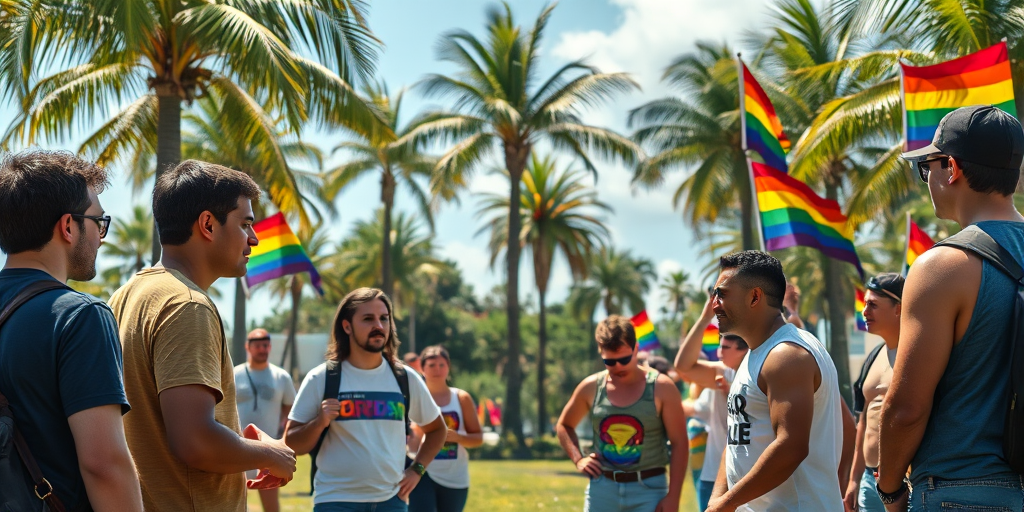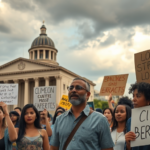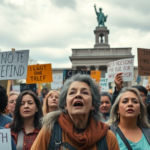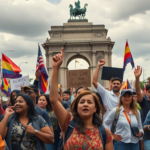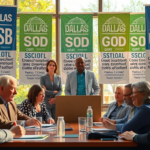Florida Ranks at the Bottom of LGBTQ+ Safety List: A Deep Dive into the Report
Florida has been ranked the worst state for LGBTQ+ safety, according to a recent report by SafeHome.org, sparking concern and debate across the nation. The report’s findings highlight a troubling environment for the LGBTQ+ community within the Sunshine State, scoring a mere 35.69 out of 100 due to factors like low hate crime reporting rates and legislation perceived as anti-LGBTQ+. Governor Ron DeSantis’ initiatives have been notably cited as influencing this climate.
Summary of Findings
The report indicates that 71% of LGBTQ+ adults in Florida have avoided public spaces for fear of discrimination or potential violence. This fear is compounded by the state’s notably low hate crime reporting, with only 44% of law enforcement agencies submitting relevant data to the FBI in 2023. Furthermore, although several anti-LGBTQ+ bills were introduced in 2025, many failed to advance beyond the committee stage. These legislative efforts attempted to restrict diversity, equity, and inclusion (DEI) initiatives and proposed bans on the use of preferred pronouns at workplaces.
For context, the top ten worst states for LGBTQ+ safety alongside Florida include Louisiana, Mississippi, Tennessee, Utah, South Dakota, Alabama, Kansas, Nebraska, and Georgia.
The Local Impact in Florida
In Florida, the ramifications of such low rankings are varied and deeply personal. As a state known for its large LGBTQ+ communities, particularly in cities like Miami and Orlando, the report’s findings are a sobering reminder of the challenges still faced. Josephine Rodriguez, a Miami resident and LGBTQ+ activist, shared her concerns: “We’ve been fighting for our rights and safety for decades. This report underscores the work we still need to do, especially with the current political climate.”
This news is particularly unsettling ahead of Pride Month 2025. Despite safety concerns, Pride celebrations will continue, serving as a beacon of solidarity and resilience for the community. Organizers are emphasizing vigilance, advocating for community safety by recommending measures such as staying hydrated, implementing buddy systems, and adhering to protest and active shooter safety protocols.
Broadening the Conversation on Legislation
Under Governor DeSantis, Florida has seen significant legislative changes impacting the LGBTQ+ community. Notable laws include the controversial “Don’t Say Gay” initiative, which restricts the discussion of sexual orientation within educational settings, alongside laws limiting access to gender-affirming care and penalizing prohibited bathroom use by transgender individuals. These legislative actions contribute heavily to Florida’s poor ranking.
The implications of such policies are far-reaching. According to a survey by the Human Rights Campaign Foundation, 80% of transgender or nonbinary individuals in Florida plan to leave the state due to safety concerns, illustrating a pervasive worry regarding basic rights and safety.
Such legislative dynamics are not isolated. The rise in anti-LGBTQ+ sentiment across other states shares similar themes, often resulting from political decisions that prioritize discriminatory policies over inclusivity. However, efforts to counteract these measures exist, with some community members and activists opting to stay and fight against these legislative challenges.
Rhode Island Sets an Example
Contrasting Florida’s position, Rhode Island ranks as the best state for LGBTQ+ safety, attributed to robust legal protections, progressive healthcare policies, and excellent hate crime reporting by law enforcement agencies. Rhode Island’s commitment to fostering an inclusive society could serve as a template for Florida and similar states aiming to improve their rankings.
Rhode Island’s success includes providing benefits to same-sex partners as early as 2001, recognizing same-sex civil unions and marriages years before significant federal changes, and maintaining high rates of hate crime data reporting.
Implications for the Future
The low ranking poses critical implications for Florida’s LGBTQ+ community. Apart from the potential exodus of residents, it could impact Florida’s reputation as an inclusive destination, economically affecting tourism-related businesses and community events heavily reliant on active participation.
Local stakeholders are encouraged to foster discussions and engage with policymakers to ensure that future legislation supports diversity and equity, promoting a more inclusive community environment. This can involve organizing public forums, advocacy campaigns, and partnerships with human rights organizations to amplify the voices of those affected.
As Florida navigates these challenges, attention to community interests remains paramount. Resources like the local Human Rights Campaign office provide vital support for residents needing assistance or guidance on navigating rights and advocacy within the state.
A Path Forward
As Florida ranks the worst state for LGBTQ+ safety, it becomes evident that significant work remains. While the findings cast a shadow on the current state of affairs, they offer a critical opportunity for reflection and change. For local communities, activists like Josephine Rodriguez emphasize the need to remain vigilant. “The fight for equality is ongoing. We have to continue pushing for a more inclusive and safe environment for everyone here in Florida,” she said, highlighting the ongoing community interest and commitment to making positive changes.
Addressing these issues will require concerted efforts from citizens, advocates, and legislators alike. Navigating these challenges is central to building a Florida that upholds the dignity and respect of every resident, paving the way for a safer, more inclusive future.

